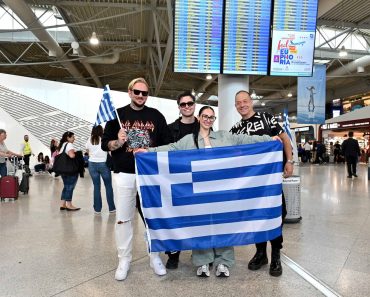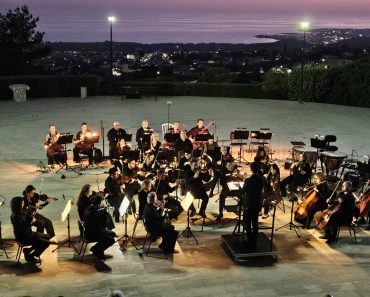Alkistis Protopsalti is one of the most important and timeless performers of the Greek music scene. Born in 1954 in Alexandria, Egypt, to Greek parents, she brought her passion for music to Athens at a young age, where she was raised. With a career spanning over four decades, she has captivated audiences with her unique voice and distinctive style, performing countless concerts in Greece and abroad. Her journey is marked by artistic consistency, numerous collaborations and accolades, establishing her as a symbol of contemporary Greek music. Greek City Times chatted with Alkistis to learn more.

Would you like to share some of your childhood moments with us?
We came to Greece with my parents when I was seven years old. My father’s and mother’s siblings were relocated—some went to America, others to Australia. My parents, Stavros and Marika, lost everything: our home, the medical office, their social circle and their relatives. It was a very difficult time in our lives. They tried to hide it from me, but I could feel that kind of upheaval. We said goodbye to Alexandria. That was the first time my life hit zero, and since then, I’ve never feared starting over. I know what it means. We came to Athens with all our memories alive: the horse carriage rides along the Alexandria beach, where I always sat in front, next to the coachman, because I had a better view and sometimes he let me hold the reins. I remember the ice cream my father would run to bring me before it melted, my mother’s laugh that echoed like a bell in my ears, my school, the Averoff School, with my classmates and our games, the evenings at home when they sang Moscholiou and Bithikotsis (you know, my mother had a better voice than mine) and so much more.
And now, Athens. At the age of eleven, when I lost my father, I began to understand what life means. I took a hard hit that threw me against the ropes, but I got back up. My mother was solid like a rock. She guided me beautifully. Ultimately, a child’s entire cultural upbringing begins at home, encompassing ambitions and dreams. I always remember the advice: “Respect the people you meet on your way up, because you’ll meet them again on your way down.”
How has your origin from Alexandria, Egypt, influenced your artistic path?
It shaped my emotional world; that deep sound of “Ah” in the soul makes you sing better. Later, empathy developed in me to the fullest. In life, help where you can, do good without expecting anything in return, especially for children, be the voice for those who have none. Offer to those around you, however and wherever you can. Culture is doing the right thing when no one is watching.
What was your first time with music and what led you to become a singer? Share with us your first concert at the Palais des Sports in Thessaloniki in 1975. How important was that moment for you?
Composer Dimos Moutsis discovered me back then and my first song was “God Abandons Antony”, “Say goodbye to Alexandria, which you are losing” by the great Alexandrian poet Constantine P. Cavafy.
It was obvious that singing and music in general were coursing through my veins. Always with my guitar in hand, surrounded by people, on trips and at parties, I enjoyed playing it. Twelve years without a microphone, saying the morning prayer in front of my classmates at school, from elementary through high school.
I also had another big love: track and field. I was in Panionios, running the 100 meters and the 4×100 relay, but at the final turn, by a chest’s width, I chose the path of music. The most beautiful marathon of my life.
That name “Protopsalti” hides millions of hours of work, sweat, perseverance and principles. Nothing was handed to me freely. I always strive for the best, the most correct, with the utmost respect for the audience. To never betray my beliefs.
What has been your most important collaboration so far and why?
There isn’t a single “most important”; there are links that formed a significant chain. Performances with great directors, inspired composers, exceptional colleagues and musicians who created a magnificent color palette. Hundreds of live shows, thousands of experiences.
I travel the world, invest in my ears and eyes, translate what I see, discover what the arts and entertainment have to offer and what opens the mind. To be inspired by the best.
How do you deal with the pressure of maintaining long-lasting success in the music industry?
As lyricist Lina Nikolakopoulou says, “Leading roles drink fire.”
I’ve learned to function under all conditions, always aiming to realize my vision in the best way possible. What matters is having collaborators who share the same aesthetic values and are always raising the bar.
I like having people around me who have a spark in their eyes and don’t wear watches.
What is your position on politics and how does it affect your artistic creation?
I believe that art has the power to act as a counterbalance in these difficult times we live in, a crisis that affects everyone and is not only economic but also social and moral. Art has always been and always will be a refuge for the soul, BUT I am afraid of the lack of justice, education, culture and the lack of domestic and foreign policy.
I am outraged by political indifference, economic condemnation and the disgraceful healthcare system.
I fear the inexistence of dreaming, the systematic numbing of society and the endless burning and vandalism in Athens.
I am angered by the absence of planning for “extreme events,” which always ends with: “Beautiful Greece burns and drowns beautifully.”
How important was your role as Minister of Tourism in the interim government of 2015?
Politics is a special marathon with hurdles, ascents and risky crossings. You can’t “learn it” in just a few steps, but you can contribute something. What I can tell you is that during those 22 days I served my country in the interim government as Minister of Tourism, it was a time of absolute awareness. It was a supreme honour to serve Greece in a completely different way, though not far from what I’ve always done for my homeland through music. I fully understood the meaning of the word “service” in government.
Looking back, one of the most beautiful moments of my life was that OATH to the homeland, when I raised my hand, I held my whole life in my fingers. My mind raced with images, memories, my parents, my friends and everything I loved smiled and took its place to watch through my SOUL. I tried hard not to let my emotions overflow.
Later, the only thing I lost was my sleep. Tons of adrenaline to keep everything running smoothly. 22 days with a single goal: to do your job as well as you can.
The Ministry of Tourism is amazing, a bright mirror of the country and our culture, the heavy artillery of Greece.
What can you tell us about family and your personal life?
Family is very important in every person’s life, everything starts from there: character formation, education, values and dreams. As for my personal life, it remains personal.
How do you choose the songs you perform in a concert or on an album?
It all begins with the lyrics, then the emotion, the time and the venue.
There is incredible variety in the songs and the projects I take on and that creates a stunning landscape for me.
From a single piano and one voice to symphony orchestras and choirs, an unbelievable range of emotions.
What keeps you creating and performing music after all these decades?
In three words: Passion, love and communication.
Your message to the Greek diaspora.
I love the diaspora. I’m glad I meet them every year all over the world, I engage with them and understand their deepest emotions and concerns. I wish you peace, health, prosperity and that you fill your hearts with optimism, dreams and opportunities.
I hope your nostalgia for Greece remains alive and that one day you return to our beautiful homeland.
Your life motto.
Carpe diem: seize the day and don’t let it go to waste.






